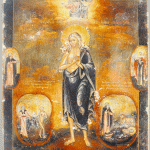Tertullian, before he turned Montanist, wrote of that mercy which the martyrs could and did give to others:
But you have come within its walls for the very purpose of trampling the wicked one under foot in his chosen abode. You had already in pitched battle outside utterly overcome him; let him have no reason, then, to say to himself, “They are now in my domain; with vile hatreds I shall tempt them, with defections or dissensions among themselves.” Let him fly from your presence, and skulk away into his own abysses, shrunken and torpid, as though he were an outcharmed or smoked-out snake. Give him not the success in his own kingdom of setting you at variance with each other, but let him find you armed and fortified with concord; for peace among you is battle with him. Some, not able to find this peace in the Church, have been used to seek it from the imprisoned martyrs. And so you ought to have it dwelling with you, and to cherish it, and to guard it, that you may be able perhaps to bestow it upon others.[4]
![St Cyprian's Reliquary. Photograph by ACBahn (Own work) [GFDL (http://www.gnu.org/copyleft/fdl.html) or CC BY-SA 3.0 (http://creativecommons.org/licenses/by-sa/3.0)], via Wikimedia Commons](https://wp-media.patheos.com/blogs/sites/637/2016/10/CyprianusReliquiar-225x300.jpg)
Although you sent letters to me in which you ask that your wishes should be examined, and that peace should be granted to certain of the lapsed as soon as with the end of the persecution we should have begun to meet with our clergy, and to be gathered together once more; those presbyters, contrary to the Gospel law, contrary also to your respectful petition, before penitence was fulfilled, before confession even of the gravest and most heinous sin was made, before hands were placed upon the repentant by the bishops and clergy, dare to offer on their behalf, and to give them the eucharist, that is, to profane the sacred body of the Lord, although it is written, “Whosoever shall eat the bread and drink the cup of the Lord unworthily, shall be guilty of the body and blood of the Lord.” [5]
And so, at a council with other bishops, St Cyprian showed that indeed, mercy could be given, though the martyrs would have to indicate who exactly among the lapsed they felt were worthy of such forgiveness.[6] That is, St. Cyprian and others with him, agreed that the wishes of the martyrs could be upheld so long as those who were being restored to communion were known to be penitent:
But you ought also to bring back and amend that matter according to your diligence, in such a way as to designate those by name to whom you desire that peace should be granted. For I hear that certificates are so given to some as that it is said, Let such a one be received to communion along with his friends, which was never in any case done by the martyrs so that a vague and blind petition should by and by heap reproach upon us. For it opens a wide door to say, Such a one with his friends; and twenty or thirty or more, may be presented to us, who may be asserted to be neighbours and connections, and freedmen and servants, of the man who receives the certificate. And for this reason I beg you that you will designate by name in the certificate those whom you yourselves see, whom you have known, whose penitence you see to be very near to full satisfaction, and so direct to us letters in conformity with faith and discipline.[7]
Truly, then, we can see how the value of the martyr’s intercession could be seen as effective, bringing great mercy to penitent sinners. If they were able to bring such grace thanks to their work for Christ, if they were able to intercede for others in the midst of their martyrdom, what are we to think of them now that they have died? Are they now silent? No, we see, once again, the earliest Christians recognizing that the martyrs of Christ joined the cloud of witnesses in and with Christ, and so were glorified in Christ, receiving a share of eternal life in Christ. St. Ignatius, we are told, demonstrated this glorification, this assurance, after his martyrdom to many of his flock:
Having ourselves been eye-witnesses of these things, and having spent the whole night in tears within the house, and having entreated the Lord, with bended knees and much prayer, that He would give us weak men full assurance respecting the things which were done, it came to pass, on our falling into a brief slumber, that some of us saw the blessed Ignatius suddenly standing by us and embracing us, while others beheld him again praying for us, and others still saw him dropping with sweat, as if he had just come from his great labour, and standing by the Lord. When, therefore, we had with great joy witnessed these things, and had compared our several visions together, we sang praise to God, the giver of all good things, and expressed our sense of the happiness of the holy [martyr]; and now we have made known to you both the day and the time [when these things happened], that, assembling ourselves together according to the time of his martyrdom, we may have fellowship with the champion and noble martyr of Christ, who trod under foot the devil, and perfected the course which, out of love to Christ, he had desired, in Christ Jesus our Lord; by whom, and with whom, be glory and power to the Father, with the Holy Spirit, for evermore! Amen.[8]
The martyrs were seen as the backbone of the Church, holding it up, not just by the shedding of blood for the sake of Christ, but by being vessels of graceful mercy to those who were left behind. Those who lapsed found the petitions of the martyrs able to free them from their sin and to find themselves, after penance, restored to communion quicker than if they had no such intercession on their behalf. Having witnessed the peace reestablished in the Church thanks to the intercession of the martyrs, the faithful could then begin to see and understand how a glorified martyr, a glorified saint in God, could and would continue to intercede for them, and bring help in times of spiritual trial and tribulation. The historical experience of the martyrs and the mercy they were able to bring to the faithful thus is the foundation for the theology of the treasury of the saints; even if that theology at times went astray, the core of it remains true and we can and should hold out with open hearts all the grace the saints bring to us, looking not only to those saints glorified in heaven, but those who, even now, are saints in the making, living for Christ, praying for and receiving great mercy for us all.
[1] Martyrdom of Ignatius in ANF(1):131.
[2] Martyrdom of Polycarp in ANF(1):43.
[3] Origen, “An Exhortation to Martyrdom” in Origen: An Exhortation to Martyrdom, Prayer and Selected Writings. trans. Rowan A. Greer (New York: Paulist Press, 1979), 79.
[4] Tertullian, Ad Martyras in AFNF(3): 693. Sadly, once he became a Montanist, he would repudiate such mercy to the lapsed,
[5] St. Cyprian of Carthage, Letter 10 in ANF(5): 291.
[6]See St. Cyprian of Carthage, Letter 53 in ANF(5): 336.
[7] St. Cyprian of Carthage, Letter 10 in ANF(5): 291-2.
[8] Martyrdom of Ignatius in ANF(1):131.
Stay in touch! Like A Little Bit of Nothing on Facebook:
A Little Bit of Nothing











